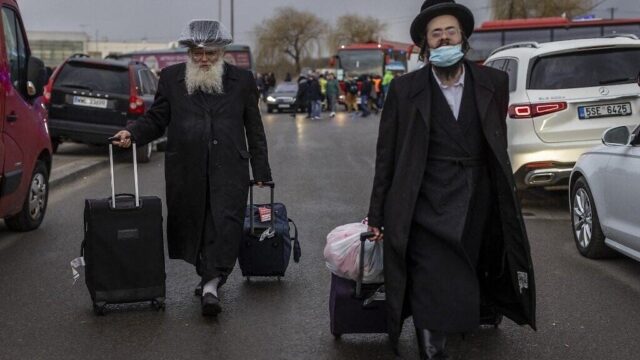Israel Exodus: Jewish Emigration and the Collapse of the Israeli State

How demographic woes add fuel to the Zionist fire.
One of the defining characteristics of Jewish identity is movement. Whether the Biblical exodus of Jews from Egypt, forced expulsions from Europe or the waves of global migration — Jews are the peripatetic people par excellence. But a new Jewish movement has begun which threatens to plunge Jews into yet another existential crisis: emigration from Israel.
Since the founding of the Jewish state in 1948, Israel has seen steady population growth from around 600,000 at its founding to roughly 7.7 million today. The trend has been for year-on-year population increases, with a spike following the collapse of the Soviet Union in the 1990s.
Since 2023, however, this trend has reversed. That year, 55,300 Israelis emigrated from the country, a 46.4% rise compared to 2022. Some 12,300 Israelis fled the country as a direct result of Hamas’s October 7th military operation. A significant share of those departing were recent immigrants, particularly from Russia and Ukraine. Excluding these departing immigrants, net Israeli migration figures in 2023 still exceeded historic norms, with an estimated net loss of around 18,800 compared with positive balances of between 16,600 and 38,100 in previous years. Of the total who left, two-thirds identified as Jewish and one-third as non-Arab Christians.
Data for 2024 showed the number of emigrants rising even further to a record 82,700. That year Israel had net-negative immigration balance of around 30,000. Figures also show that around 15,000 fewer people immigrated to Israel in 2024 compared to 2023, a 31% fall.

It is likely that the 12-day war between Israel and Iran — in which a significant number of Iranian missiles struck Israel — will be a further catalyst for Jewish emigration. However, it is not only conflict which is spurring Israelis to flee. There is a growing dissatisfaction among Jews over the political situation in Israel where the right-wing coalition government led by Benjamin Netanyahu has instigated reforms aimed at weakening the power of the judiciary. The proposed laws would allow a simple majority (61 out of 120) in the Knesset to override Supreme Court decisions invalidating laws. Israel has seen mass protests over the reforms with hundreds of thousands taking to the streets.
High cost of living in Israel is also exacerbating the problem. In 2022, Israel had the highest cost of living among all countries in the Organisation for Economic Cooperation and Development (OECD). Prices of consumer goods in the country are 38% higher than the OECD average, and 51% higher than European Union countries. Bread costs are 82% higher than those in the US. Household debt in Israel rose to 770 billion Shekels ($222 billion) in 2022, a 49% increase from 2017.
Most of the long-term emigrants tend to be highly educated professionals concentrated in central Israel and Tel Aviv, heightening concerns about a potential brain drain. Of those who left in 2023, 54% had more than 13 years of formal education compared to 44% of the general Israeli population. Emigrants also tend to be younger with those aged 20 to 40 making up 40% of the total. Data shows that Israel is now one of the least attractive destinations for those with graduate degrees compared to 35 other OECD countries.
Employment is cited as the primary motivator for Jews leaving Israel “with the majority perceiving an improvement in their economic situation in foreign countries” (Aizencang-Kane [1], p. 6). The biggest economic push factors are reportedly unemployment, inflation and income.
A study of 323 Israeli doctors who trained abroad between 2013 and 2024 revealed that just over half did not return [2]. Factors reducing return‑intent include high financial costs, job insecurity and lack of positions in Israel matching their specialty. Only secure job placement significantly increased confidence to return.
An increasing number of Israelis who do not wish to fully detach themselves from Israel are adopting a transnational lifestyle in which they work outside of Israel but regularly return for business and family reasons [3].
If record numbers of Jews are fleeing Israel, where are they going? As of early 2025, estimates suggest some 630,000 Jewish Israelis or their dependents now live abroad, reviving shrinking Jewish communities in Europe, especially in Germany, Norway, Finland and the Netherlands. Other estimates put that figure at more than 1 million [1]. Despite fleeing their nation, Israelis remain engaged in their home country “while simultaneously integrating into the social fabric of their host nations” (Aizencang-Kane [1], p. 5).
Canada received 5,759 applications for work permits from Israeli citizens between January and October 2024, up from 1,616 the previous year. Some Jewish emigrants in Canada have established websites dedicated to helping their fellow Israelis move to the country.
Jewish emigrants are also settling in Greece which is described as a “perfect choice for Israelis”. One emigrant family who ended up in Crete said they moved from a kibbutz in northern Israel following “post-October 7th nightmares” and a fear of Hezbollah attacks.

Another popular destination is Cyprus, the eastern Mediterranean island only 200 miles off the coast of Israel. The growing number of Jews moving there is causing consternation among Cypriots, with the issue bleeding into political discourse. Official statistics show that 2,500 Israeli Jews live permanently in Cyprus, but this figure is thought to be closer to 12,000.
There is a growing concern over Jewish land purchases in Cyprus. Stefanos Stefanou, the secretary general of Cyprus’s second-largest political party, AKEL, has warned of Israeli ghettos forming as emigrants set up businesses, schools and synagogues. Stefanou is quoted as saying that the Israelis are “taking the country away from us” in patterns similar to those seen in occupied Palestinian territories. There are also warnings from analysts that continued Israeli land purchases could pose a threat to Cyprus’s political and economic sovereignty.
The largest segment of the Israeli diaspora reside in North America, with the US being the primary location of choice followed by Canada [1]. In Europe, the top Israeli destinations are England, Germany and France [1]. Latin America is perceived as less attractive compared to other more developed regions [1]. Some 84% of Israeli emigrants live in English-speaking countries [4].
Israeli emigrants experience difficulties in integrating with local populations, including other Jews born among the natives [1]. Even after residing in the host population for a significant amount of time, raising children and achieving economic success, Israelis tend to limit their social circle to other Israelis [5]. In locations where Israelis make up smaller proportions of the population like in Europe and Australia, Israelis associate almost exclusively with other Israeli-born Jews, creating “ethno-national Israeli enclaves” [6].
Rather than make Israeli Jews less racially conscious, living in foreign countries tends to strengthen their Jewish identity. This process “involves a deliberate effort to recreate and reaffirm their connection to their identity and sense of belonging within the broader Jewish collective” (Aizencang-Kane [1], p. 8). Israelis who identify as secular before emigrating to places like New York, Paris or London tend to engage more actively in Jewish religious practices in the diaspora [1]. Most Israelis choose to reside near pre-established Jewish communities in urban centres [7].
It has been argued that Israelis residing outside of Israel (the Yordim) constitute a diaspora per se but one still of a piece with the wider Jewish diaspora [8]. However, some counter that the Israeli diaspora is now a distinct community in its own right and even that it alone represents the “authentic” Jewish diaspora [9].
The Israeli diaspora has largely shed its negative self-perception as marginalised immigrants with many Israeli Jews now “proudly assuming their transnational lifestyles without hesitation” (Aizencang-Kane [1], p. 14). This is attributed to:
“a shift in the perspectives of host societies, particularly local Jewish communities, as well as Israeli society, which has become more accepting of the decision to reside outside the nation’s borders. The newfound confidence and openness among Israeli migrants have spurred the emergence of organized Israeli communities…” (Aizencang-Kane [1], p. 14).
Some of the many Israeli diaspora organisations include Israeli Medical Students Abroad, Israeli Physiotherapists in Europe, Israeli Educators Worldwide, Israeli Doctors in Australia, Israelis in Switzerland, Menagvim in Berlin and Israelis in Hoboken [1]. Other more overtly political initiatives have been created in order to strengthen ties between Israel and its diaspora. One of these called The Eighth Million Campaign lobbied the Israeli government to recognise the diaspora as a strategic asset of the State of Israel and encourage the Israeli diaspora to return to Israel to vote in elections [1].

Another similar group — The Israeli American Coalition for Action (IAC for Action) — lobbies Congress on issues such as Iran and boycott, divest and sanctions (BDS) [1]. The IAC for Action worked with both Republicans and Democrats to “advance legislation on these issues” (Aizencang-Kane [1], p. 14). Yet another initiative called CONNECT IL—NY Liberal Israelis is concerned with allowing Israelis abroad to stay connected to Israeli society and building bridges between Jews in the US and Israel [1].
The October 7th, 2023, Hamas military operation, and Israel’s ensuing carpet bombing of Gaza, galvanised the Israeli diaspora in support of their home nation. Israeli expatriates were central in organising “aid operations” for Jews in Israel:
“In a noteworthy aid operation initiated at the onset of the war, the US‐based protesters dispatched four tons of supplies to Israeli soldiers who faced shortages of essential equipment amidst the military’s call‐up of 300,000 reservists. Numerous Israelis residing in New York and throughout the USA also traveled to Israel to join the reserves” (Aizencang-Kane [1], p. 14).
According to data from the World Zionist Organisation, some 85% of Israelis living abroad have taken part in activities in support of the Israeli state since October 7th [1]. One notable initiative was the hosting of online forums for Israelis organised by the group HaHorim. The group’s founder Liti Haramaty is an Israeli woman who has lived in New Jersey for almost 30 years [1].
The emergence of the Israeli diaspora signals a further fracture point for Jewish identity. Already polarised politically, Jews are becoming an increasingly diverse group with the Israeli diaspora and Jews of Colour the latest factions to plant their flags on the already heterogeneous hill of Judaism.
Other factors give cause for concern over the long-term viability of Israel. Although birthrates of Israeli Jews and Arabs are now both at around 3 children per woman, the Palestinian birth rate remains slightly higher at 3.3. Although the ultra-orthodox Haredi Jewish birthrate is falling, it remains at about 6.5, while the religious Zionist/modern orthodox rate is about 4. Both these figures dwarf that for secular Jews which stands at 2.2. Overall, Israel’s Jewish majority has shrunk from 77% to 76.9%, while Israel’s Arab population has grown from 20.8% to 21%.
Another factor is Israel’s plummeting support among young Americans. A 2025 Gallup poll found that only 10% of Americans under 35 approve of Israel’s military actions in Gaza. Similarly, a Brookings poll found only 9% of Americans aged between 18 to 34 approve of Israel’s actions. Favourable views towards Israel among 18- to 34-year-olds fell from 64% in 2022 to 38% in 2025.
The long-term viability of Israel will weigh heavily in Jewish calculus over Gaza. Given the prognosis for Israel and Jewish power more generally, it may be now or never for the Jewish state. Only countries with a time horizon measured in decades and even centuries can afford policies of constraint and diplomacy. Indeed, some prominent Jewish figures are calling for Israel to return to an aggressive security posture and reject the dovish proclivities that have dominated the Israeli political and military establishments over recent years.
President of the Jerusalem Institute for Strategy and Security Efraim Inbar and former IDF brigadier general Menachem Bacharach argue that Israel’s policy of constraint has failed. They state that containment damages Israel’s capacity for deterrence and that “fear is the best political currency in the region” (Inbar & Bacharach [10], p. 44).
Israel’s security doctrine has been based on three main tenets: deterrence, early warning and decisive victory [10]. Decisive victories and displays of military force “are required to strengthen cumulative deterrence” (Inbar & Bacharach [10], p. 35).
Restraint not only normalises the use of force by Israel’s adversaries but allows for the incremental ratcheting up of violence against the state [10]. Containment “also breeds complacency and leads to failures in deterrence. In Gaza, it produced conditions that led to a calamitous strategic surprise” (Inbar & Bacharach [10], p. 45).
Jews expect the Israeli state to fulfil its social contract and protect them from violence and today “Israel is paying a staggering price for its delay in mounting a strong military response to previous provocations, which would have instilled fear in its enemies” (Inbar & Bacharach [10], p. 45).
What is needed in Israel is “an enduring solution” argues a prominent Jewish foreign diplomat writing pseudonymously (Domingo [11], p. 16). The Palestinian question needs to be “excised by Israel once and for all” (Domingo [11], p. 20):
“Israel’s internal problems cannot be fixed nor regional tensions reduced unless the Palestinian question is resolved. Left unaddressed, it will continue to fester and the situation will become increasingly dangerous. Pointing the way, Hillel the Elder (110 BCE to 10 CE) famously wrote in the Ethics of the Fathers, “If I am not for myself, who will be for me? …. And if not now, when?” (Domingo [11], p. 21).
The world may be about to witness the full wrath of Jewish vengeance in Palestine: the deliberate killing of all two-million Gazans. We may also see the full annexation of the West Bank and the expulsion of the Palestinians living there. The telos of Jewish power, the logic of Zionism and the misanthropy of Judaic racial supremacy may demand nothing less.
What more fitting a way to mitigate Jewish emigration — to balance Israel’s demographic books — than extermination with extreme prejudice?
[1] Aizencang-Kane, P. (2024). Crisis and political transnationalism: the awakening of the Israeli diaspora. Contemporary Jewry, 45, 16.
[2] Seluk, L., Weltsch, D., Segal, G., & Gilbao, M. (2024). Motivations of Israeli physicians to return, or not, to Israel after their fellowship abroad. Israel Journal of Health Policy Research, 13(1), 65.
[3] Aizencang, P. (2019). An analysis of transnational life: the case of Israeli migrants living in Mexico. Hagira Israel Journal of Migration, 10, 1–25.
[4] Lev Ari, L. (2020). Jews residing in three cities in France and Belgium: patterns of ethnic identity and identification. In J.R. Ross, S.J. Gold, & L. Ansell (Eds.), Wandering Jews: Global Jewish Migration (pp. 81-118). West Lafayette: Purdue University Press.
[5] Gold, S. (2022). Segmented and transnational identity formation in the Israeli diaspora. In R. Kenedy, U. Rebhun, & C. Ehrlich (Eds.), Israel and the diaspora: Jewish connectivity in a changing world (pp. 99-114). Boston: Brill.
[6] Porat, R. (2018). The Ausraelis: Israelis in Australia as a test case of distinctiveness vis‐a‐vis the Jewish Diaspora. Israel Affairs, 24(1), 167–190.
[7] Aizencang, P. (2018). Diáspora judía, diáspora israelí y niveles de convivialidad. CoAct International Journal, 1, 20–35.
[8] Sheffer, G. (1998). The Israeli diaspora: Yordim (emigrants) are the authentic diaspora. In S. Massil (Ed.), The Jewish Year Book (pp. ix‐xxxi). London: Vallentine Mitchell.
[9] Rebhun, U., & Lev Ari, L. (2010). American Israelis: migration, transnationalism and diasporic identity. Boston: Brill.
[10] Inbar, E., & Bacharach, M. (2024). The perils of containment/restraint in Israel’s national security behavior. Israel Journal of Foreign Affairs, 18(1), 35-47.
[11] Domingo, M. (2024). A way forward even in Israel’s darkest moment. Israel Journal of Foreign Affairs, 18(1), 13-22
https://therighttodissent.substack.com/p/israel-exodus-jewish-emigration-and
